Why Was a Perfectly Good Boat Abandoned at Sea? (Videos)
The Sad Story of Time Aut's Voyage to the Islands, Explained

The sailing world was abuzz with scepticism recently as the U.S. Coast Guard reported rescuing three men in a sailboat that wasn’t sinking. Why? According to the Coast Guard, they were experiencing up to 20-knot winds and 10-foot seas and feared the boat would capsize.1
On December 12, the trio abandoned a 2005 Beneteau Oceanis 523 that was 150 miles southeast of Cape Hatteras—sails furled, a $225,000 purchase left to drift toward Scotland.
The wind and seas were as reported by the Coast Guard at the time of rescue.
“Capsizing seems unlikely in those stated conditions, but we weren't there,” wrote Tad Roberts, a Canadian naval architect. “Cape Hatteras in December is too late in the year. Big, fat, snap-rolling boat with short crew, the one experienced person gets exhausted after four days, and they give up.”
Of course, as Roberts noted, we weren’t aboard that 53-footer to feel their pain, but sceptics also had a point: Max 10-foot seas make for bumpy ride but are well within the boat’s ocean rating for waves above 13 feet. That CE A-rating also certifies the vessel for up to 40-knot winds, and, let’s face it, some of our boats don’t begin to really sail until winds approach 20 knots.
The questions are: What had happened since Time Aut left the vicinity of Norfolk four days earlier? How correct was Roberts in his assessment?
First the Backstory
Time Aut’s owner is retired Austrian insurance executive Thomas Hagspiel, who embarked from Sardinia in 2023 on a six-to-seven-year circumnavigation at age 64. He crossed over to the Western Hemisphere that year in the ARC—Atlantic Rally for Cruisers—as part of which hundreds of sailboats cross the Atlantic annually. Then he took a scheduled detour from the circumnavigation to go up the East Coast of the U.S.
The call for rescue came during Time Aut’s return south, a Chesapeake-to-Caribbean passage before transiting the Panama Canal. The boat had a website listing company sponsors and a motto: “Sailing with friends.”
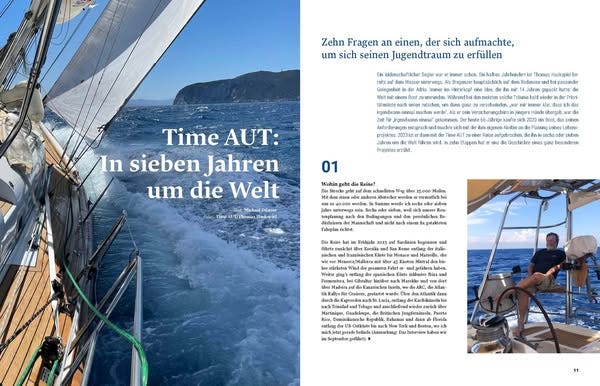
The sailing-with-friends notion was further described on the website:
We are happy to take friends and sailing enthusiasts on our trip for a fair share of the expenses. However, we are not paid skippers who accept orders like in a charter company. Our route planning is therefore always based on good seamanship and the personal needs of the crew and not on a fixed timetable…You can assume average costs per week of €850 per person/€1500 for a cabin.
In American money, $886 or $1,565 a week.
Hagspiel’s description of weather conditions differed from the Coast Guard account. In a Facebook post, Hagspeil said they had faced gusts of more than 60 knots and seas higher than 23 feet—and they were running out of diesel. Oceanis fuel capacity is listed at 198 gallons.
To have used nearly a tankful of fuel in four days suggests that Time Aut was motoring most, if not all the time.
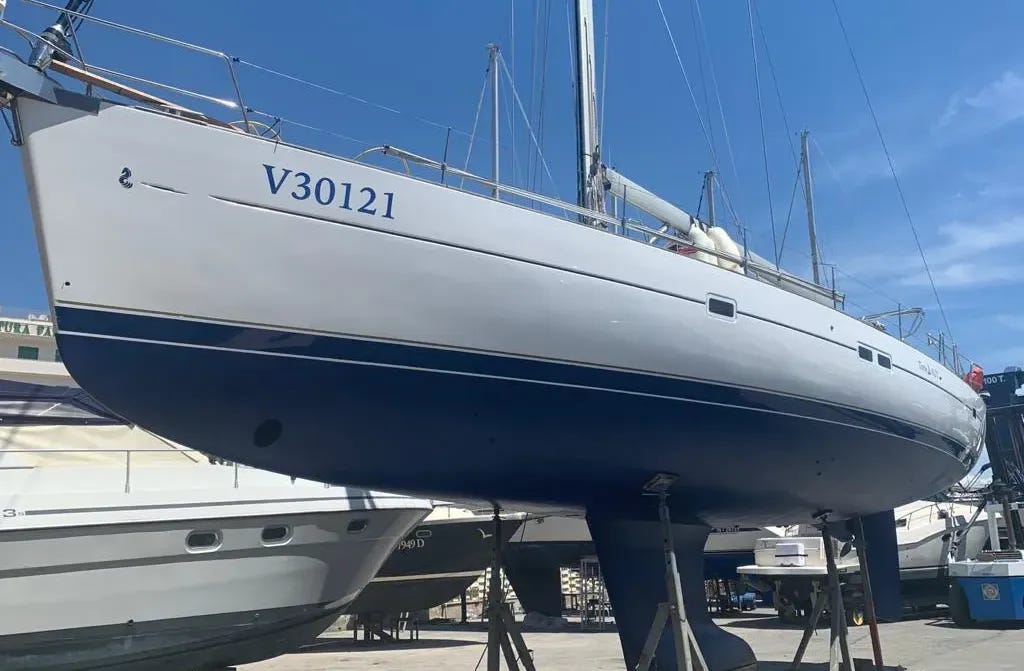
Foul Weather Forecast
As it happened, the conditions Time Aut encountered were forecast on Saturday, December 7, the day before she got underway at Norfolk, according to weather router Chris Parker. Here is a portion of his forecast:
Norfolk-Hatteras-CpLookout: Travel remains doable today before SW-W wind starts to rebuild later this evening/tonight and more so on Sun8, so any vessels underway should aim to arrive in Cape Lookout by this evening or midnight tonight at the latest. Generally inclement Sun8 with the travel window remaining closed Mon9 onward through midweek as adverse southerly flow persists and squalls develop around late Mon9-Tue10, with conditions becoming strongly inclement by Wed11 due to the front.
As far as the actual conditions, Parker said that by the time the Coast Guard helicopter arrived on the scene weather was improving markedly, and Time Aut would have been able to sail all the way to the Bahamas on a broad reach. According to Parker, Time Aut’s crew was hauled onto the Coast Guard helicopter about 12 hours after the cold front had passed.
Parker has been guiding cruisers on passage through those same waters for more than 20 years. This was his assessment of what had happened:
The video taken from the vessel with a man at the helm steering shows the boom centered. I cannot determine when the video was taken, nor whether the vessel was sailing or motoring, but there was ample wind for sailing in the video, and there had been ample wind for sailing since vessel exited the Gulf Stream (early Tue10 according to vessel tracking info on marinetraffic.com).
If the vessel was low on fuel, and assuming they departed Chesapeake Bay (presumably late Sun8) with full fuel, and there was no fuel leak, then it seems reasonable to conclude the vessel spent considerable time motoring or motorsailing too much into the brisk S-SSW winds from Tue10 thru Wed11 evening.
Maintaining a heading too close to the wind in these conditions could easily have exhausted the crew, and could have contributed to any gear failures which may have occurred.
Our recommendation to the vessel would have been to not depart with a forecast for strong headwinds. And, if the vessel departed, then encountered strong headwinds, we would have advised to only sail "as close a reach as you can, without sacrificing too much speed / comfort," and definitely NOT sailing or motorsailing too close to the wind for conditions.
If the vessel had been in contact with any weather router, the vessel should have known what to expect ahead of the ColdFRONT, and they should also have known that, as soon as the ColdFRONT passed, the remainder of their trip would be in good-but-brisk sailing conditions on a broad reach to downwind. They abandoned ship about 12 hours after the ColdFRONT passed, and after conditions had subsided very significantly.
I can only conclude that conditions were so bad onboard, due to at least a few imprudent decisions, that the crew opted to abandon ship even after the weather event had passed.
Loose Cannon did try to open a dialogue with Hagspiel about his decision-making, but he did not respond to messages.
Without talking to the skipper, there’s no way to know if the two men sailing with him were friends, family or paying customers, but one could understand how someone might feel paying hundreds of dollars a week only to have the ever-livin’ shit kicked out of him.
All of which suggests that Tad Roberts was probably right. Forty-eight hours of gale conditions wore out the crew. Sapped of motivation, they gave up.
PORTSMOUTH, Va. — The Coast Guard rescued three mariners Thursday morning from a sailing vessel beset by weather 154 miles southeast of Cape Hatteras.
At 3 p.m. on Wednesday, Coast Guard Sector Charleston notified watchstanders at the Fifth Coast Guard District Command Center that the 59-foot sailing vessel TIME-AUT was caught in heavy weather and at risk of capsizing.
The mariners aboard the vessel initially stated that they were not in distress, however early Thursday morning the mariners aboard the TIME-AUT requested to abandon their vessel, prompting watchstanders to direct the launch of an HC-130 Hercules airplane crew and an MH-60 Jayhawk helicopter crew from Coast Guard Air Station Elizabeth City, and the Coast Guard Cutter Richard Snyder crew.
The Hercules and Jayhawk crew arrived on scene at 9:30 a.m. with the Jayhawk crew successfully hoisting all three mariners from their vessel at 10 a.m. No injuries were reported.
The vessel was equipped with life jackets, life rafts, an Emergency Position Indicating Radio Beacon, and Starlink communications.
The weather on scene was reported at 17-23 mph winds with seas of 6-10 feet.
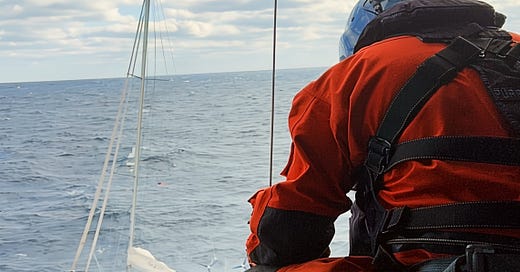


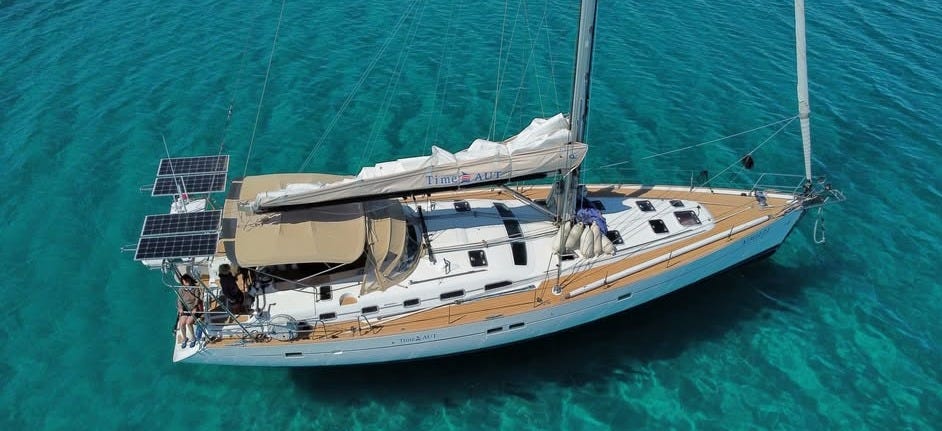
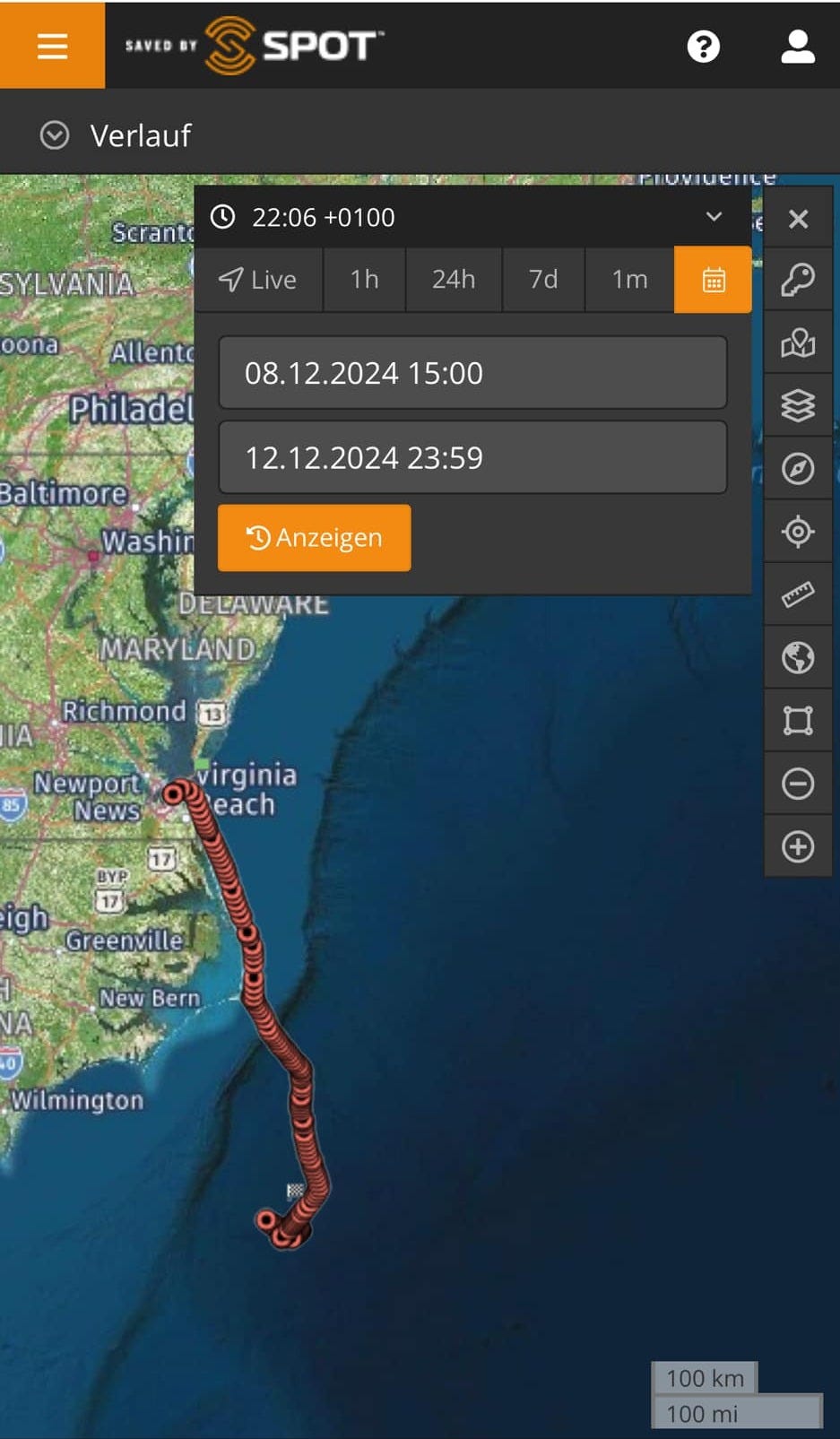
They need to turn in their Man cards.
What pu$$ies. They can't turn in their man cards: they never had any!
The boat was happy to see them go. The boat was ashamed of them.
(Yes, even plastic ocean-going sailboats have souls. More than a lot of people I know.)
And yes, I've been in Much MUCH worse conditions than that. Lots of times. Solo and with crew.
I never considered punching the EPIRB. I always knew the boat could take more than I could.
Even if rolled and dismasted, I knew the boat would float.
I hope the boat gets better owners next time.